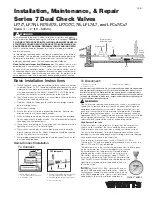
IP Router Configuration
Configuring
ip-global
network features
Stinger®
IP2000 Configuration Guide
4-21
pools-JFAN-TNT Password = "ascend", Service-Type = Outbound
Ascend-IP-Pool-Chaining = IP-Pool-Chaining-Yes,
Ascend-IP-Pool-Definition = "1 11.168.6.10 10",
Ascend-IP-Pool-Definition = "2 12.168.6.10 10",
Ascend-IP-Pool-Definition = "3 13.168.6.10 10",
Ascend-IP-Pool-Definition = "7 17.168.6.10 10",
Ascend-IP-Pool-Definition = "8 18.168.6.10 10",
Ascend-IP-Pool-Definition = "9 19.168.6.10 10"
Note
To support IP pool chaining in RADIUS profiles, the RADIUS server must
support vendor-specific attributes (VSA) and the system must be configured in VSA
compatibility mode. For details, see “Pool chaining in RADIUS” on page 4-23.
IP pool chaining is supported both for RADIUS-defined address pools and for pools
defined locally in the
ip-global
profile. For example, the following settings in the
ip-
global
profile enable pool chaining and define a pool chain (pools 1 and 2) that
contains 252 addresses:
[in IP-GLOBAL]
pool-chaining = yes
pool-base-address = [ 172.20.31.1 172.20.33.1 0.0.0.0 153.37.21.1 0.0+
assign-count = [ 126 126 0 30 0 0 0 0 0 0 0 0 0 0 0 0 0 0 0 0 0 0 0 0 0+
Pool chaining in local profiles
Whether pool chains are defined locally or in RADIUS, the pool addresses are
available for dynamic assignment regardless of where the connection’s profile is
authenticated.
Overview of local profile settings
Following are the parameters, shown with default settings, relevant to IP pool
chaining:
[in IP-GLOBAL]
pool-chaining = no
pool-base-address = [ 0.0.0.0 0.0.0.0 0.0.0.0 0.0.0.0 0.0.0.0 0.0.0.0+
assign-count = [ 0 0 0 0 0 0 0 0 0 0 0 0 0 0 0 0 0 0 0 0 0 0 0 0 0 0 0 0+
[in CONNECTION/"":ip-options]
address-pool = 0
Parameter
Setting
pool-chaining
Enable/disable IP pool chaining. With the
yes
setting,
the system treats contiguous IP address pools as a single
extended pool space when searching for an available
address to assign to a connection.
pool-base-address
An array of up to 128 IP addresses to be used as the first
address in a pool. These values are used with the
assign-count
values to define address pools locally. A
pool chain contains all of the pools defined in sequence
within the array, such as 1, 2, 3. To end a pool chain,
leave a null value in the array.
















































